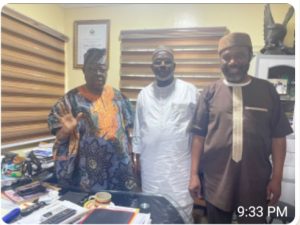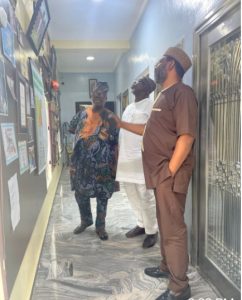Uncategorized
Practitioners Set Agenda For Professionalism, Port Growth

…Urge FG To Respect Trade Conventions And Protocols
BY EGUONO ODJEGBA

R-L Prince Shittu, Aare Olarewaju and Dr. Nweke
Unarguably concerned about the nation’s port industry perceived low rating across critical indexes, high heel industry chieftains, respected freight forwarders and customs brokers have set development agenda for the federal government and its agencies.
According to a release signed by Dr. Eugene Nweke, former National President of the (National Association of Government Approved Freight Forwarders), on behalf himself, Prince Olayiwola Shittu (former National President, Association of Nigeria Licensed Customs Agents) and Aare Hakeem Olarewaju (former Chairman, Council for Regulation of Freight Forwarding in Nigeria) expressed worry about observed professional absence in the industry, particularly about emerging trends in international trade, which the group say are issues in global discourse as it pertains to freight forwarding.
Amongst other issues, the group identified perceived sluggishness in the driving of SMART BORDERS Concept, which it says is in support of the Sustainable Development Goal (SDG) of the United Nations (UN) Agenda 2030; as a lead to the myriad of other challenges in customs and international trade.
The strategic meeting also discussed the possible kick start of the domestication process for FIATA newly introduced protocols with regards to approved and applicable imports clearance documents across the WTO member countries.
The statement reads: “The consultative meeting was prompted by noticeable professional absence in the ongoing global discourse on emerging trends in freight forwarding.
“The evolution of the SMART BORDERS Concept which is in support of the Sustainable Development Goal ( SDG) of the United Nations ( UN) Agenda 2030. The Concept makes room for Customs to ensure:
- Timely delivery of raw materials to industries.
- Reduce unfair business competition.
iii. Open opportunities for all business interests to access Raw Materials.

- Creates transparent, conducive and predictable conditions for trade/passengers.
- Facilitate legitimate trade that will in turn contribute positively to economic growth, as well as boosting job creation.”
Nweke disclosed that the eminent freight professionals also contemplated proposal to begin the review of the SGD Compliance in order to encourage ease of doing business.
“In this direction, the meeting resolved to carry out a robust review on the level of compliance to the SGD from the Nigeria freight forwarders perspective, and document same for a global representation. “Equally, the meeting took a holistic review of the present clearance process and procedures within the Customs Ports, with deep reservation while commending government’s efforts at reinstalling mobile scanner machines at some ports.”
The group also discussed other tools of businesses and compliance issues which includes the following:
a). Today Freight Forwarding practices revolves around a Growing E-Commerce Logistics Solution – where information communication technology drives the international trade security and value adding supply chain. Notably, both the World Trade Organization and World Customs Organization now focuses attention on “Exploring the Integrated E-commerce Logistics Solutions “.
b). Revisit the current annual growth rate in: Business to Customer ( B2C); Business to Business (B2B); and the Producer to Consumer (P2C).
It noted the grappling challenges inherent in these increasingly demanding innovative logistics solutions. Wherefore, it posited that, there will be need to chart a course towards the need to choose the right kind of Customs procedures that will open new potential for improvement and advancement of the evolving new markets concepts.
c). Reconsider the update and possible outcome of the WTO treatise consideration to E-commerce, especially as it relates to the ‘plurilaterals’ discussion following the proposals submitted by the ‘plurilaterals’ members; among the developing countries, including Nigeria, expressing their discomfort with the US model of digital trade rules centered around “Free Data Flows”.
d). Expresses serious concerns on the E-commerce Moratorium. Though the WTO’s Customs Duties E-commerce Moratorium, has been halted since 2019, however, the increasing globalization disruption points to the fact that, trading goods electronically may not be easy to abate.
“As such this Moratorium if continued may mean a continuation of Zero customs duties on goods which are traded via electronic transmissions. Above all there will be tariff revenue losses as well as the loss of policy space for those who may try to support their domestic industries in electronic traded goods.
“In view of this, the meeting resolved to further its strategic consultative goals with the management team of the Nigeria Customs Service”
The statement note that the Customs alone cannot boast of deploying requisite energy in this aspect of trade model and inherent revenue generation.

























